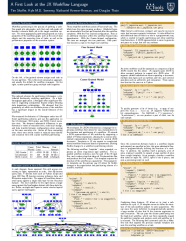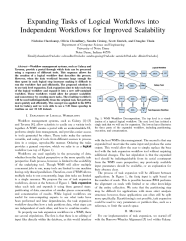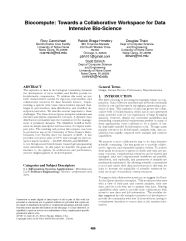
Makeflow is a workflow system for executing large complex workflows on clusters, clouds, and grids.
Makeflow is easy to use. The Makeflow language is similar to traditional Make, so if you can write a Makefile, then you can write a Makeflow. A workflow can be just a few commands chained together, or it can be a complex application consisting of thousands of tasks. It can have an arbitrary DAG structure and is not limited to specific patterns.
Makeflow is production-ready. Makeflow is used on a daily basis to execute complex scientific applications in fields such as data mining, high energy physics, image processing, and bioinformatics. It has run on campus clusters, the Open Science Grid, NSF XSEDE machines, NCSA Blue Waters, and Amazon Web Services. Here are some real examples of workflows used in production systems:

(Makeflow Examples Repository)
Makeflow is portable. A workflow is written in a technology neutral way, and then can be deployed to a variety of different systems without modification, including local execution on a single multicore machine, public cloud services such as Amazon EC2 and Amazon Lambda, batch systems like HTCondor, SGE, PBS, Torque, SLURM, or the bundled Work Queue system. Makeflow can also easily run your jobs in a container environment like Docker or Singularity on top of an existing batch system. The same specification works for all systems, so you can easily move your application from one system to another without rewriting everything.
Makeflow is powerful. Makeflow can handle workloads of millions of jobs running on thousands of machines for months at a time. Makeflow is highly fault tolerant: it can crash or be killed, and upon resuming, will reconnect to running jobs and continue where it left off. A variety of analysis tools are available to understand the performance of your jobs, measure the progress of a workflow, and visualize what is going on.
Getting Started
Online Introduction to Workflows
Research Publications
(Showing papers with tag makeflow. See all papers instead.)

|
Tim Shaffer, Nathaniel Kremer-Herman, and Douglas Thain, |

|
Qimin Zhang, Ben Tovar, Nate Kremer-Herman, and Douglas Thain, |

|
Nicholas Hazekamp and Douglas Thain, |

|
Tim Shaffer, Kyle M.D. Sweeney, Nathaniel Kremer-Herman, and Douglas Thain, |

|
Kyle Sweeney and Douglas Thain, |

|
Kyle Sweeney and Douglas Thain, |

|
Nicholas Hazekamp, Nathaniel Kremer-Herman, Benjamin Tovar, Haiyan Meng, Olivia Choudhury, Scott Emrich, and Douglas Thain, |

|
Haiyan Meng and Douglas Thain, |

|
Charles (Chao) Zheng, Ben Tovar and Douglas Thain, |

|
Dinesh Rajan and Douglas Thain, |

|
Patrick Donnelly and Douglas Thain, |

|
Patrick Donnelly, |

|
Nicholas Hazekamp, Joseph Sarro, Olivia Choudhury, Sandra Gesing, Scott Emrich, and Douglas Thain, |

|
Charles (Chao) Zheng and Douglas Thain, |

|
Patrick Donnelly, Nicholas Hazekamp, Douglas Thain, |

|
Olivia Choudhury, Nicholas L. Hazekamp, Douglas Thain, Scott Emrich, |

|
Nicholas Hazekamp, Olivia Choudhury, Sandra Gesing, Scott Emrich, and Douglas Thain, |

|
Casey Robinson and Douglas Thain, |

|
Peter Bui, |

|
Michael Albrecht, Patrick Donnelly, Peter Bui, and Douglas Thain, |

|
Rory Carmichael, Patrick Braga-Henebry, Douglas Thain, and Scott Emrich, |

|
Peter Bui, Li Yu, Andrew Thrasher, Rory Carmichael, Irena Lanc, Patrick Donnelly, Douglas Thain, |

|
Irena Lanc, Peter Bui, Douglas Thain, and Scott Emrich, |

|
Andrew Thrasher, Rory Carmichael, Peter Bui, Li Yu, Douglas Thain, and Scott Emrich, |

|
Li Yu, Christopher Moretti, Andrew Thrasher, Scott Emrich, Kenneth Judd, and Douglas Thain, |

|
Douglas Thain and Christopher Moretti, |

|
Rory Carmichael, Patrick Braga-Henebry, Douglas Thain, and Scott Emrich, |